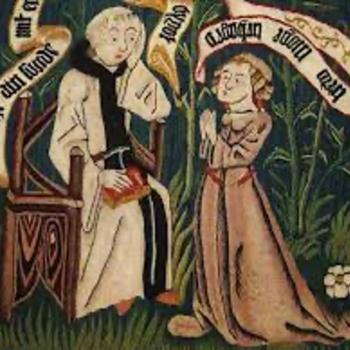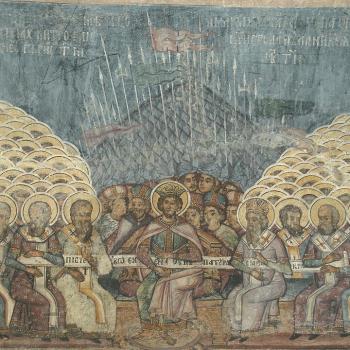Almost as long as I’ve been coming to meetings of the Conference on Faith and History, I’ve been especially drawn to discussions of the relationship between historians and the church. I wrote my faculty promotion essay as a response to Wheaton College historian Tracy McKenzie’s 2012 presidential address, on Christian historians’ “vocation to the church.” Then at last week’s 2018 meeting of CFH, a personal highlight was getting to moderate a roundtable discussion of the “distribution problem” that Raully Donahue described in an Anxious Bench post last fall — namely, that Christian scholars like us members of CFH struggle to reach Christians beyond academe.
So I was struck by three more guest mini-posts that I received from fellow CFHers: one encouraging and two more challenging. Like Brenda Schoolfield, CFH 2018 left me “renewed in my conviction that history… has the ability to build community and to reconcile” as we pursue truth faithfully. At the same time, Mark Correll is right that such truth-seeking requires us to tell “the complicated history of our churches and the evils that are done in Jesus’s name.” So while I resonated strongly with Beth Allison Barr’s sense of CFHers being “my people,” I take seriously Matt Stewart’s caution that scholars not let fellowship with members of a professional society — Mark’s “small band of memory-bearers” — obscure our connections with the larger membership of the Body of Christ.
(I certainly don’t think Beth — a pastor’s spouse, recent preacher, and active church member as well as a historian — meant it that way. But speaking for myself, I do find it easy, in Matt’s words, “to sit back and watch as the lives and histories of our fellow church members are deconstructed” — and so to feel increasingly distant from and perhaps superior to those fellow Christians.)
Thanks to today’s three guest-bloggers, as well as to the four who shared reflections yesterday, for giving me insight into sessions I wasn’t able to attend — and for letting our readers join these important conversations.
Brenda Thompson Schoolfield: My first Conference on Faith and History left me renewed in my conviction that history as a discipline has the ability to build community and to reconcile in our work as faithful truth tellers. Telling the truth builds community across time and in the present by giving context to developments that affect our lives today and by showing how people are connected to each other by and through their pasts. Telling the truth reconciles through constructing faithful narratives—ones that don’t mask the ugly or confusing and ones that includes those who have previously been ignored. Telling the truth reconciles through mediating the sources (the voices) of the past.
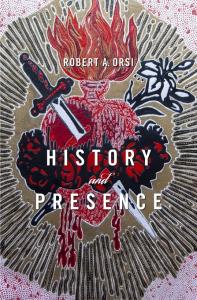 The work of doing history is worth the effort, but it is at times onerous, burdensome, and distressing. In his Saturday afternoon plenary address, Robert Orsi gave us a powerful example of how our work affects us. What should we do with the disgust we feel as we uncover/recover stories of broken, damaged human actions and their consequences? We cannot be silent; we must tell those stories truthfully. It’s a work that requires love and care even through our disgust. Then in a session on “Theology and Spirituality in the Doing of History,” Mark Sandle implored us to care for the dead. We should not use the dead for our own selfish ends, but we should engage in hesed shel emet (the truest act of kindness because it cannot be reciprocated) so that the fragments of the dead (their stories, their remains) will bear witness. We have the power to undermine the inhumanity of forgetting the dead.
The work of doing history is worth the effort, but it is at times onerous, burdensome, and distressing. In his Saturday afternoon plenary address, Robert Orsi gave us a powerful example of how our work affects us. What should we do with the disgust we feel as we uncover/recover stories of broken, damaged human actions and their consequences? We cannot be silent; we must tell those stories truthfully. It’s a work that requires love and care even through our disgust. Then in a session on “Theology and Spirituality in the Doing of History,” Mark Sandle implored us to care for the dead. We should not use the dead for our own selfish ends, but we should engage in hesed shel emet (the truest act of kindness because it cannot be reciprocated) so that the fragments of the dead (their stories, their remains) will bear witness. We have the power to undermine the inhumanity of forgetting the dead.
I didn’t expect such a profoundly moving experience from a history conference. The CFH is far more than an academic conference. I found the sessions and the conversations engaging on a spiritual level, challenging and encouraging me as a historian and as a Christian.
Brenda is chair of the Division of History, Government, and Social Science at Bob Jones University.
Mark Correll: In the Saturday morning roundtable on Tal Howard’s The Pope and the Professor, Jeffrey Zalar questioned Protestantism’s oversimplification of the understanding of Pius IX’s Syllabus of Errors (1864) and its place in elevating to heroic stature the rationalist Catholic theologian Ignaz von Döllinger. Zalar reminded the listeners that the Syllabus of Errors was never meant to deny the forces of modernity; rather, they were meant pastorally as a way to keep parishioners from sins and confusion. The church bears as its responsibility the responsibility of protecting its most vulnerable members. This idea was turned on its head during Robert Orsi’s plenary session on “The Study of Religion on the Other Side of Disgust.” As the church’s own intention to preserve the faith of its laity by avoiding scandal which might lead to disbelief facilitated the church’s own worst corruptions and active participation in brutal sins.
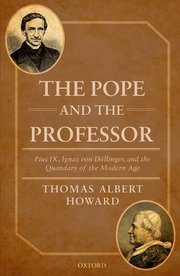 As I sat in my Sunday morning church service listening to a triumphant telling of the story of God’s actions in the creation of modern Methodism in the United States, the CFH haunted me. Where is the space for telling the complicated history of our churches and the evils that are done in Jesus’s name? Certainly Christian colleges create a little bit of space, but our thoughts (perhaps due to our distribution problem) aren’t reaching even the well-educated portions of our church. Is there a space in our world to deal with the complexities of belief, faith, generative spiritual activities, and active sins?
As I sat in my Sunday morning church service listening to a triumphant telling of the story of God’s actions in the creation of modern Methodism in the United States, the CFH haunted me. Where is the space for telling the complicated history of our churches and the evils that are done in Jesus’s name? Certainly Christian colleges create a little bit of space, but our thoughts (perhaps due to our distribution problem) aren’t reaching even the well-educated portions of our church. Is there a space in our world to deal with the complexities of belief, faith, generative spiritual activities, and active sins?
In What is Christianity? (1900), Adolf Harnack accuses Catholics of creating a two-tiered system, a modern mystery religion, where only a small cohort of super-Christians is allowed to live the full Christian life. Harnack praises the democratic virtues of Protestant freedom for all to live Christian freedom. In our own self-policing of the story of our institutional sins, have we created a small band of memory-bearers who mourn for the loss so that the others of the church need not be so burdened?
Mark is chair of the Department of History, Political Economy, Geography, and Social Studies at Spring Arbor University.
Matthew D. Stewart: My flight from Grand Rapids to Denver was delayed on the Saturday that the Conference on Faith and History concluded, so I had the strange experience of waking up in Denver and then walking into the middle of the sermon at my small church in Nampa, Idaho a few hours later. I might as well have been teleported, as I was wearing the same clothes I had worn in the Calvin College Chapel a mere fifteen hours earlier, where Robert Orsi told me, if I heard correctly, that the sexual abuse crisis of the Roman Catholic Church, only the latest of Christianity’s failures, has finally obliterated the radical hope of verses I cling to, such as Romans 12:21 or Revelation 21:5. I dissent.
Working my way back towards a conscious union of body, soul, and mind, it felt strangely providential when my ears told me that my pastor had started speaking about how we define our “we.” He then included the phrase, “this is your people.” Before Communion, he reminded us that we eat at the Lord’s Table with other Christians across space and time. I looked around the church and saw our newest member, who had been baptized only a month ago. I then received the holy meal from the hand of a farmer, a hand that bore the marks of a near-fatal early morning car accident. These are my people.
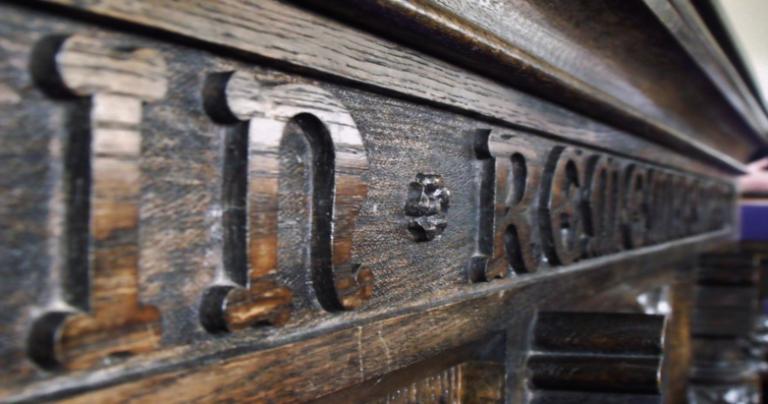
I describe this experience because the idea of the CFH as “my people” was sitting uneasily in my mind after CFH president Beth Allison Barr’s address, in which she said that the CFH was her people. Though it was not the main point of her address or one that she developed at length, the idea is one that might carry more weight for the CFH than I think it should. Especially given the fact that a significant portion of CFH members study what amounts to the failures of American Christianity from the past to the present, of which there are many, I think the CFH should actually guard against becoming a people. If it does become a people, I worry that it will then be a place where it is too easy to sit back and watch as the lives and histories of our fellow church members are deconstructed, sometimes out of a necessary desire to serve in a prophetic role and tell the truth about the past, but perhaps at other times with motives that should be resisted. I have felt and fought them myself.
My people might not be able to name a single plank of the Bebbington quadrilateral. They might, like my dad, be put to sleep by scholarly articles because they have been working on their feet all day. These are the people, however, who visit me when I’m in the hospital, as they did when my lung collapsed several years ago. They are the ones that smile radiantly at my kids, and whose grandkids chase them shrieking across the grass after church. They feed my family in their homes and know my name without needing to practice that ultimate conference skill of holding eye contact while searching for a name tag (which by some strange force of nature is always backwards) simultaneously. Professional organizations are valuable. Like nations, however, they have a shelf life. I hope the CFH survives another fifty years. But I’ll stake my membership in the body that was told on good authority that it will withstand the gates of Hell.
Matt is a PhD candidate in the history department at Syracuse University.



